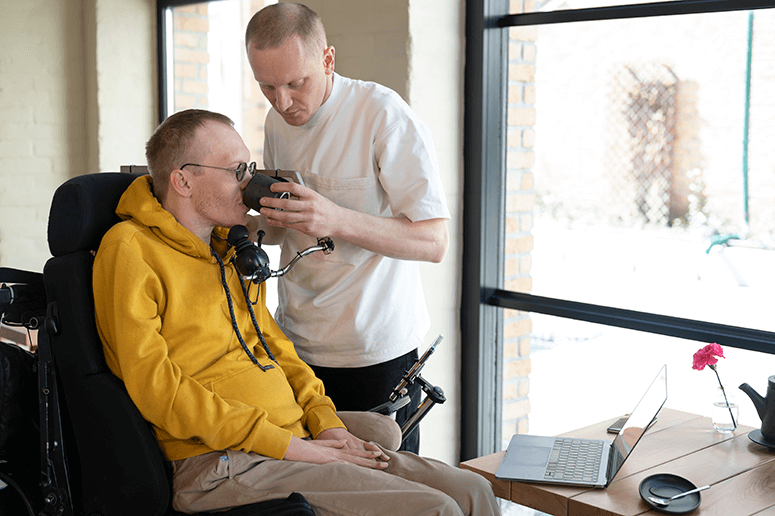A novel approach to battle cerebral stroke and multiple sclerosis
Dec. 11 was an extraordinary day for me. I had quite an eventful day with two patients with different medical conditions. It was like witnessing the most celebrated miracle of the 20h century. I must admit that it was emotionally and professionally challenging to handle such cases. Let’s break down each case:
Case No. 1: Cerebral stroke patient. The patient is a 71-year-old male with a history of a stroke three weeks ago. Manifestations include severe slurring of speech and difficulty swallowing.
He has multiple comorbidities such as diabetes and chronic kidney disease.
Despite his age and health challenges, he led a very active and vibrant life, having been a professor, executive, and a topnotcher in the Chemical Engineering Board.

Umbilical cord mesenchymal stem cells were infused on Dec. 11. While infusion was going on, he was singing our national anthem, Lupang Hinirang, and kept on talking with 65-percent improvement in his pronunciation. His swallowing reflex also improved. His agility was remarkably boosted.
Now he can shift from lying down to sitting and standing up flawlessly. However, after his post-stem cell transfusion on Dec.13, he developed puffiness of the face and swelling of the right arm, which eventually disappeared .
Case No. 2: Multiple sclerosis patient. The second patient is a 45-year-old lady diagnosed with multiple sclerosis (MS), who opted for a rejuvenation treatment. Multiple sclerosis is a disease that impacts the brain, spinal cord and optic nerves, which make up the central nervous system (CNS) and control everything we do.
The potential of umbilical cord stem cells in treating cerebral stroke and multiple sclerosis continues to captivate the scientific community.
Multiple sclerosis is an unpredictable disease of the central nervous system that disrupts the flow of information within the brain, and between the brain and body. The exact cause of MS is unknown, but we do know that something triggers the immune system to attack the CNS.

The resulting damage to myelin, the protective layer insulating the wire-like nerve fibers, disrupts signals to and from the brain. This interruption of communication signals causes unpredictable symptoms such as numbness, tingling, mood changes, memory problems, pain, fatigue, blindness and/or paralysis. Everyone’s experience with MS is different and these losses may be temporary or long-lasting.
The patient’s decision to undergo treatment for rejuvenation suggests a desire for improved well-being or quality of life. This second case was not as smooth as the first one.
Initial blood pressure (BP) was already high at 150/94. This went up during the transfusion to 170/104 so we stopped the transfusion, gave her paracetamol for headache and calcium channel blockers, which improved her headache and eventually lowered her BP to 160/100. We then continued with the transfusion very slowly and eventually her BP became normal at 128/80.
Her second day was unremarkable, which she spent mostly sleeping. Her energy, according to her partner, was noticeably heightened.
It’s apparent that both cases present unique challenges. Caring for a stroke patient with multiple comorbidities requires a comprehensive approach, addressing not only the acute stroke but also managing the other health issues. The patient’s vibrant past adds a layer of complexity, as maintaining a good quality of life becomes a significant goal.
On the other hand, dealing with a patient with multiple sclerosis involves managing a chronic condition that often requires long-term care and symptom management. The patient’s choice of treatment for rejuvenation raises questions about her expectations and the role of medical intervention in improving her overall health.
Medical advancements in recent years have opened up new frontiers in the treatment of neurological disorders, offering hope and potential solutions where conventional therapies might fall short.
One promising avenue of research involves the use of umbilical cord stem cells, unlocking the potential to address conditions such as cerebral stroke and multiple sclerosis. In this article, we explore the innovative applications of umbilical cord stem cells in the context of these two distinct yet impactful neurological challenges.
What you need to know about Umbilical cord stem cells
Umbilical cord stem cells, often referred to as mesenchymal stem cells (MSCs), just like the bone marrow-derived HMSCs, are potent cells with the unique ability to differentiate into various cell types.
Derived from the umbilical cord tissue, these cells exhibit remarkable regenerative properties and immunomodulatory effects. Unlike embryonic stem cells, the use of umbilical cord stem cells raises fewer ethical concerns, making them a compelling treatment option for cerebral stroke and multiple sclerosis patients.

Cerebral stroke, a debilitating condition often resulting from interrupted blood supply to the brain, can lead to severe consequences such as impaired speech, paralysis, and cognitive deficits. Recent studies have explored the potential of umbilical cord stem cells in mitigating the effects of stroke. These include:
- Regeneration. Umbilical cord stem cells have the ability to promote the regeneration of damaged neural tissue, aiding in the recovery of lost functions.
- Anti-inflammatory effects. These cells modulate the inflammatory response, reducing secondary damage to the brain tissue after a stroke.
- Angiogenesis. Umbilical cord stem cells stimulate the formation of new blood vessels, enhancing blood flow to the affected areas of the brain.
Several clinical trials are underway to assess the safety and efficacy of umbilical cord stem cell therapy in stroke patients. Preliminary results show promise in improving neurological function and quality of life.
While there is currently no cure for MS, the use of umbilical cord stem cells presents a novel approach to managing the symptoms and potentially halting the progression of the disease.
Early-stage clinical trials exploring the use of umbilical cord stem cells in MS patients have shown encouraging results. Improved mobility, reduced relapse rates, and enhanced quality of life are among the reported outcomes.
While the use of umbilical cord stem cells holds great promise, ethical considerations and rigorous research are paramount. Clear guidelines and standards must be established to ensure the responsible and ethical use of this innovative therapy.
As research progresses, the potential of umbilical cord stem cells in treating cerebral stroke and multiple sclerosis continues to captivate the scientific community.
The journey from bench to bedside is ongoing, but the strides made so far offer a glimmer of hope for individuals grappling with these challenging neurological conditions.
In the quest for effective treatments, umbilical cord stem cells, just like bone marrow stem cells, serve as a beacon of hope, pointing toward a future where regenerative medicine transforms the landscape of neurological care.
I’m glad to hear that these two patients are experiencing such a positive impact, and it’s heartwarming to know that they consider it the greatest Christmas gift of their lifetime.


